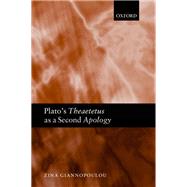Plato's Theaetetus as a Second Apology
, by Giannopoulou, Zina- ISBN: 9780199695294 | 0199695296
- Cover: Hardcover
- Copyright: 8/24/2013
Zina Giannopoulou argues that Theaetetus--Plato's most systematic examination of knowledge--is a philosophically sophisticated elaboration of Apology that successfully differentiates Socrates from the sophists. In Apology Socrates defends his philosophical activity partly by distinguishing it from sophistic practices, and in Theaetetus he enacts this distinction: the self-proclaimed ignorant and pious Socrates of Apology poses as the barren practitioner of midwifery, an art that enjoys divine support, and helps his pregnant interlocutor to engender his ideas. Whereas sophistic expertise fills others' souls with items of dubious epistemic quality, Socratic midwifery removes, tests, and discards falsities. In Theaetetus Plato drapes the Socrates of Apology with obstetric garb and stages a philosophical contest between him and the seemingly wise men with whose definitions Theaetetus' soul teems, chief among whom is Protagoras. By proving the indefensibility of these definitions, Socrates challenges their authors' wisdom--since for him no one can justifiably be said to have knowledge if he cannot give an account of knowledge. On the other hand, his own inability to procure the definition he seeks confirms his assertion that he lacks wisdom. Giannopoulou goes on to explore how in Apology Socrates claims that his wisdom consists in his awareness of his lack of wisdom, and in Theaetetus he validates this claim: his attempt to discover what knowledge is, coupled with his intellectual barrenness, shows both that he does not have what he is looking for and why this is the case.







